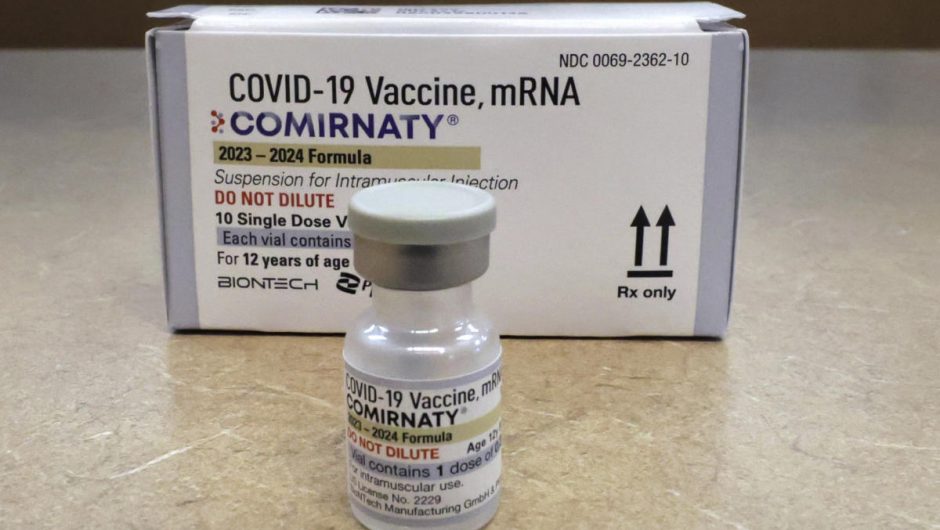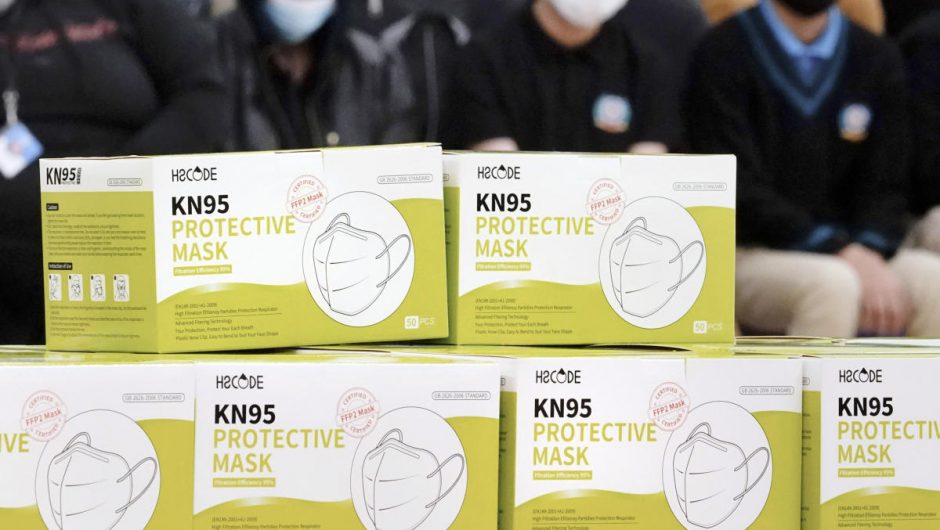[ad_1]
A court order that permitted Keith Smith, on a ventilator in a medically induced coma from COVID-19, to be treated with the controversial drug ivermectin, was issued late Friday afternoon.
The order, in response to Darla Smith’s petition to compel the hospital to administer the drug to her husband of 24 years, was, to some, kind of confusing, and that led to two days of lawyers negotiating its implementation, frustrating Darla’s attempts to have her husband receive the drug.
This photo of Keith and Darla Smith was attached as an exhibit in the lawsuit that sought to have Keith’s COVID-19 infection treated with the controversial drug ivermectin. Darla Smith won the case, but it led to a struggle to get the drug administered to her husband, who is on a ventilator in UPMC Memorial’s ICU.
The brief order denied Darla Smith’s request for an emergency injunction to force UPMC to administer ivermectin, an anti-parasitic that is not part of the medical center’s COVID-19 protocols and is not approved by the U.S. Food and Drug Administration for the treatment of the viral disease.
However, the following paragraph of the order directed UPMC to allow the doctor who had prescribed the drug or another physician or registered nurse to administer it under the doctor’s “guidance and supervision.”
The court order touched off a weekend of back and forth between the lawyers involved, Darla Smith and the hospital’s administration, ending Sunday night when Keith Smith, 52, received his first dose of ivermectin.
“I finally got some sleep last night,” Darla Smith said Monday morning.
The long weekend came at the end of what has been a long month, starting when Keith Smith was diagnosed with COVID-19 on Nov. 10.
A victory, sort of
Keith Smith, a structural engineer by trade, wasn’t feeling well, and on Nov. 10 a home COVID-19 test indicated that he was infected with the virus. Darla would not say whether he was vaccinated, citing privacy laws. Both of their sons, Carter and Zach, also tested positive, as did Darla. Their cases were mild, “like an annoying flu with a persistent low-grade fever,” Darla said.
Previously:: Ivermectin: Wife of York County man on ‘death’s doorstep’ from COVID sues UPMC to use drug
‘The love of my life’: They were inseparable — until COVID took their lives 11 days apart
Story continues
‘Boy, he could play that thing’: Bluegrass legend Bill Runkle dies after contracting COVID
Keith’s infection was more serious. On Nov. 19, his wife said, he began coughing up blood. She took her husband to UPMC Memorial because it was a five-minute drive from their home in Manchester Township and “time was of the essence,” she said.
Keith Smith was put on oxygen, the machine maxed out. The hospital staff told Keith and Darla that he had to be intubated and put on a ventilator. Keith Smith “was adamant” that he didn’t want that treatment.
The next day, Keith was admitted to the intensive care unit. Darla asked the nurse practitioner who was treating Keith about ivermectin. They had consulted online with Dr. Tarik Farrag, a doctor who is affiliated with the Front Line COVID-19 Critical Care Alliance, a group that advocates for the use of ivermectin to treat the disease and had a prescription for the drug. The prescription hadn’t been filled, though.
The nurse practitioner told her the medical center does not use ivermectin because the science was unproven and that it wasn’t an approved treatment for COVID-19.
At 12:30 a.m. Nov. 21, the nurse practitioner called Darla and told her that Keith’s oxygen levels had plummeted and that he would have to be placed on a ventilator. She discussed it with her husband over Facetime, and Keith was intubated and placed on a ventilator.
That evening, Darla was doing research when she found an article about a lawyer in upstate New York named Ralph Lorigo who had successfully sued hospitals to administer ivermectin to patients gravely ill with COVID-19. She got in touch with him, and the lawsuit was filed just before Thanksgiving. The following Monday, York County Judge Clyde Vedder heard the case and four days later, issued his ruling.
During those four days, Darla said, Keith’s condition deteriorated. His ventilator settings had improved, she said, but his kidneys were failing, requiring dialysis. Later, she said, the doctor informed her that her husband’s liver was failing. There was little they could do. Keith was “on death’s doorstep,” Darla said.
Vedder’s Dec. 3 ruling stated that Darla’s “claim that we compel defendant, UPMC Memorial, to treat (Keith) with ivermectin is DENIED.” But he further ordered that UPMC “shall allow either Dr. Tarik Farrag, MD, or another physician or a registered nurse, who must be licensed by the state Board of Medicine, under the guidance and supervision of (Farrag) to have patient access to…Keith Smith, for the sole and limited purpose of administering ivermectin, as prescribed by Dr. Farrag, to Mr. Smith at the UPMC hospital facility from time to time.”
Confusion reigns
That’s where the confusion comes in. UPMC’s attorney, Thomas Chairs, questioned whether Farrag was licensed in Pennsylvania. Darla searched the state Department of State website and found that he has a temporary license to practice in the state. (Farrag practices in southern Alabama and is affiliated with an online pharmacy.)
Darla had driven to Paoli to fill the prescription, at a cost of $576. She had to find someone to administer it. State Rep. Dawn Keefer, a Dillsburg Republican, put her in touch with a husband and wife doctor team, who, in turn, put her in touch with a registered nurse who could administer the drug.
On Saturday, Dec. 4, she went to the hospital to assess her husband’s condition. His lungs were improving, but his kidneys and liver were failing. He was on blood thinners that caused some bleeding in his esophagus. His feeding tube had been turned off when he had a CT scan and ultrasound examination.
She needed to know whether his internal bleeding had stopped, whether the feeding tube had been restored and whether he was scheduled for dialysis. Darla said she couldn’t give him the drug before dialysis because it would then be filtered out of his bloodstream.
Everything fell into place, and Saturday afternoon, Darla called the RN to come to the hospital to administer the drug. She stayed on the phone with the nurse as she entered the hospital, fearing that she would meet resistance.
“I did not know what would happen,” Darla said Monday morning.
The nurse was waved in, and while she was making her way to the ICU, Darla got a call from the hospital’s vice president of medical affairs. She advised the administrator to contact her attorney. The nurse arrived at the ICU and then, in Darla’s words, “all hell broke loose.”
She and the nurse were suiting up – they had to don PPE to enter Keith’s room – when three security guards showed up to stop them. “Their demeanor was not nice,” Darla said.
What followed was about six or seven hours of phone calls. The hospital tried to argue that the judge’s order was not docketed and that, therefore, they were under no obligation to submit to it. Darla said she was doing “precisely what my attorney told me to do.” They asked about the nurse’s license.
After a while, the West Manchester Township police showed up. Darla isn’t sure who summoned them, but the hospital staff said she had to speak to the officers. She declined and the police officers, after reading the court order, determined that it was a civil matter, not a criminal one, and left, Darla said.
The hospital told her that Farrag had to be involved in administering the drug, but Farrag could not be found, Darla said. Meanwhile, Keith had dialysis treatment.
Half an hour before his dialysis was done, Darla said, her lawyer called and told her, “I think we have a solution.” Another doctor was consulted, and she was going to work with the hospital to take over the case.
Darla and the nurse prepared to administer the drug.
“At the last second,” Darla said, “my attorney called and said they changed their minds.”
Darla, who had been at the hospital for 21 hours by then, was told to go home.
“I was pissed,” Darla, a devout Christian, said. “I was pretty much at my rope’s end. I thought God had abandoned me, that God had abandoned Keith.”
He gets the drug, finally
She didn’t know that a protest was stirring. A story about her husband’s situation circulated on Facebook, and some organized a protest at the hospital. She learned about the protest from Keefer.
At first, she wasn’t going to go. She had had only two hours of sleep, and she needed to get some work done. (She works in sales for a company that manufactures electrostatic sprayers used to dispense disinfectant.) A friend called her and told her that the protesters had contacted Front Line’s public relations’ person, who had gotten in touch with Farrag and put him in contact with UPMC. Darla went to the hospital to be with the protesters.
UPMC was asking Farrag to fill out a slew of paperwork, Darla said, among which was a waiver that placed all liability for anything that may go wrong on his shoulders.
“He was spooked,” Darla said. “He said, ‘If they are this stubborn, what are they going to do to me?’”
Her attorney offered a solution, that Farrag “act as a bridge” to a different doctor, consulting on the case and thereby satisfying the requirements of the court order, Darla said.
The protest at the hospital ended at dark, and Darla went into the hospital to visit her husband. When she entered, she said she was told the ICU was on lockdown and she couldn’t visit. The hospital staff allowed her to sit in the lobby to warm up while she called her lawyer.
Finally, after Farrag and the new doctor participated in a conference call with his lawyer and hospital personnel, including the head of infectious diseases, UPMC relented. The nurse would be allowed to administer ivermectin to her husband.
A security guard escorted her and the nurse she had contacted to her husband’s room. After some confusion over the materials needed to administer the drug via Keith’s feeding tube, the nurse crushed the tablet, dissolved it with sterile water, filled the syringe and injected the drug into the tube.
Darla left the hospital at 8:15 p.m.
She got her first full night’s sleep in a long time.
UPMC explains
In a statement, UPMC said, “The Court order specifically required that treatment must be administered under the supervision of the patient’s physician, Dr. Tarik Farrag. The drug could not be administered until Dr. Farrag contacted the hospital, which did not occur until late Sunday night, causing the delay.”
This photo of Keith and Darla Smith was attached as an exhibit to the lawsuit that resulted in Keith being treated for COVID-19 with the controversial drug ivermectin.
‘Asking God WHY?’
Monday morning, Dar had meetings she had to attend for work. She hadn’t heard anything from the hospital.
She wrote on a website called Caring Bridge, “My faith has wavered this week. I’m up. I’m down. One minute, I’m on my knees with tears streaming down my face. The next, I’m driving Keith’s car, shouting and screaming and ranting till my throat breaks.
“Asking God WHY?”
She wrote, “Will ivermectin save my husband’s life? I don’t know. Maybe not.”
She concluded, “I don’t know what tomorrow holds. I don’t know where God is.”
Columnist/reporter Mike Argento has been a Daily Record staffer since 1982. Reach him at mike@ydr.com.
This article originally appeared on York Daily Record: Court orders hospital to allow ivermectin treatment in York COVID case
[ad_2]
Source link




